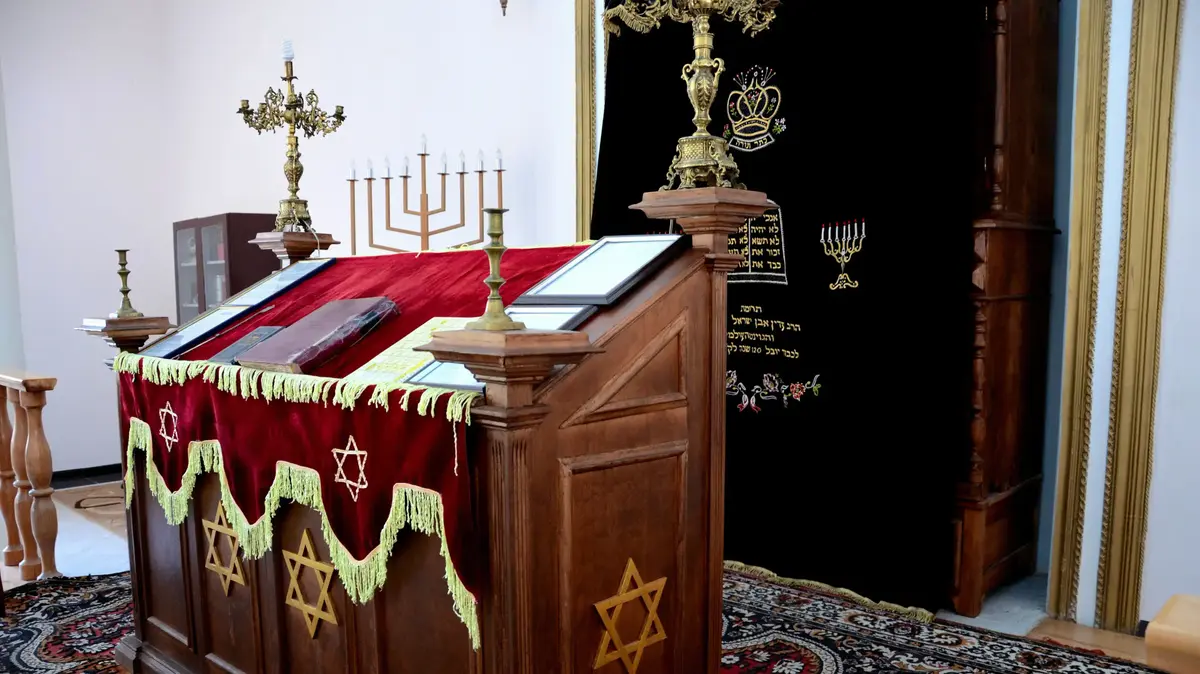Tourism
Around the world
From the Babylonian Exile to the Aliyah to Israel: The Amazing Tradition of Georgian Jewry
According to studies, the Jews arrived in a country between the Caucasus Mountains somewhere more than 2,500 years ago.
To this day you can find synagogues, museums and ancient tombs, which make up the unique mosaic of this community
Tags
Georgia
In collaboration with Pegasus
Wednesday, 11 August 2021, 07:53 Updated: 13:12
Share on Facebook
Share on WhatsApp
Share on general
Share on general
Share on Twitter
Share on Email
0 comments
A tradition of thousands of years.
Batumi Synagogue (Photo: ShutterStock)
Like the other countries around the Black Sea, in Georgia you can find remnants of an ancient and glorious Jewish heritage. According to some scholars, the first Jews arrived in the area where Georgia is today as early as the sixth century BC, following the Babylonian exile, ie more than 2,500 years ago, while according to other claims they are descendants of the ten lost tribes exiled from Israel in the eighth century BC. Either way, no one has any doubt that this is a rooted community, which of course has experienced quite a few upheavals and changes over the years.
Organized trip to Georgia including the High Caucasus and the Lower Caucasus - For more information click
Organized trip to Georgia including the mysterious Savanati region - For more information click
In time, following various changes in the European balance of power, the original Jewish Georgians joined those who had fled various riots in Russia, and although in many eyes these two communities were perceived together as "Georgian Jewry", in practice they lived separately from each other, under leaderships. And their own traditions, even when living in the same cities across the country.
By the middle of the last century, the number of Jews in Georgia had already approached 100,000, but in the 1990s, after secession from the Soviet Union (Georgia gained its independence in April 1991), many immigrated to Israel and others emigrated to various places, with large communities in Ohio and New York. for example.
Today, according to estimates by the Hebrew University, only a few thousand Jews remain in Georgia, but these continue to preserve the same wonderful heritage that can be discovered through a fascinating organized trip.
With the help of a guide who knows Georgia and its unique past at the highest level, you will get to know all the sites and places that have influenced and shaped Georgia Jewry throughout its long history.
Jews outside a synagogue in Tbilisi (Photo: ShutterStock)
About a half-hour drive northwest of the capital Tbilisi, we find the city of Metsheta, located at the confluence of the rivers Cora and Aragbi. The ancient city that was declared a World Heritage Site by UNESCO, was one of the most important in Georgia in the past due to its strategic location, between the Caspian Sea to the Black Sea.
Bmtzhth can find gravestones of Jewish graves from the third century BC, including inscriptions in Hebrew and Aramaic and Jewish symbols. Town stands The Church of Svetitschovli, which according to legend is buried in which the shirt with which Jesus was crucified, was purchased by two Jews who were present at the crucifixion and then brought back with them to her forehead, which made the church a place of pilgrimage.
In the heart of Tbilisi itself is the National Museum of Georgia, which displays a mesmerizing Jewish collection, including Judaica tools used for centuries by Jewish synagogues in the city and throughout the country, dresses and clothing items that characterized the Georgian Jewish community and even old pictures and preserved books. "The entire exhibit combines Jewish history, culture, ethnography, traditions and daily life," says the museum's website, which also features paintings by Shalom Kobushvili and David Gabelsiani, who worked in Georgia in the early 20th century and presented the local community through their works.
A short walk from the museum stands the Great Synagogue of Tbilisi.
It was built at the end of the 19th century by Jews who came from the southern city of Ahlatsiha and was named after them.
It was the largest and most magnificent of the 17 synagogues in Tbilisi (today there are two left) and can be identified by the dome that glorifies it.
Following the earthquake in 2002, the building remained damaged and in danger of immediate collapse, but with the help of a special grant, it was renovated and upgraded and now stands proudly in the city center.
A mesmerizing Jewish collection awaits you at the impressive National Museum (Photo: ShutterStock)
Also in Tbilisi is the "David Azov Museum of the History of Georgia Jewry," named after a well-known rabbi who worked in the city. It opened in 1933 and went through several locations, until it was closed in 1951 on the orders of the Soviet authorities as an antisemitic move. It returned to activity decades later, with Georgia independence and even underwent conservation. Today you can read it in letters and manuscripts and be impressed by the art of Jews and rare exhibits.
Another important Jewish community used to live in Kutaisi, where three synagogues still stand. The best-known and largest of them was also built in the late 19th century and was used by many of the 20,000 Jews who lived there. Today, only a few dozen Jewish families remain in Kutaisi, but they continue to preserve their heritage and religion, and when visiting the city you can see the old Jewish cemetery, which hints at something about the power and depth of the community.
Kutaisi Jewry was also at the heart of the famous 18-letter letter sent to the UN Commission on Human Rights in 1969. was read in the Knesset by Golda Meir and caused a storm, creating finally a change in policy and allows you 30 thousand Georgians go to Israel or to migrate to other places in the '70s.
despite contraction striking the population of Jews in the city, the Jewish Quarter in Kutaisi remained the main focus to date and it is highly recommended to walk around Discover the clues and even imagine what life on those very streets looked like in the past.
As befits one of the oldest countries in Europe in particular and in the world in general, Georgia presents an abundance of special history, including Jewish history. .
The article is sponsored by Pegasus Organized Tours - as part of its goal to promote acquaintance with world cultures and enrichment of knowledge.
The article is sponsored by Pegasus Organized Tours pegasusisrael.co.il
Share on Facebook
Share on WhatsApp
Share on general
Share on general
Share on Twitter
Share on Email
0 comments















